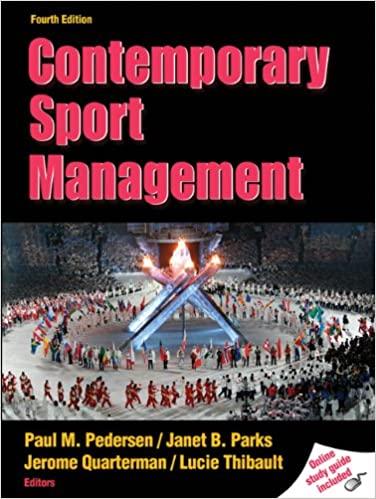Question
Management by Walking Around Is the Most Effective Management This is mostly false, but with a caveat. Management by walking around (MBWA) is an organizational
Management by Walking Around Is the Most Effective Management
This is mostly false, but with a caveat. Management by walking around (MBWA) is an organizational principle made famous with the 1982 publication ofIn Search of Excellenceand based on a 1970s initiative by Hewlett-Packardin other words, it's a dinosaur. But the idea of requiring managers at all levels of the organization to wander around their departments to observe, converse, and hear from employees continues as a common business practice. Many companies expecting managers and executives to do regular "floor time" have claimed benefits from employee engagement to deeper management understanding of company issues. While MBWA sounds helpful, it is not a panacea or cure-all. The limitations of MBWA are threefold: available hours, focus, and application.
1- Available hours. Managers are tasked with planning, organizing, coordinating, and controlling, yet even CEOsthe managers who should be the most in control of their timereport 53 percent of their average 55-hour workweek is spent in meetings. We've yet to see a meeting conducted while touring the plant!
2- Focus. MBWA turns management's focus toward the concerns of employees. This is good, but only to a degree. As noted by Jeff Weiner, CEO of LinkedIn, this is a problem. "Part of the key to time management is carving out time to think, as opposed to constantly reacting. And during that thinking time, you're not only thinking strategically, thinking proactively, thinking longer-term, but you're literally thinking about what is urgent versus important." Weiner and other CEOs argue that meetings distract them from their purpose, especially internal company interactions.
3-Application. The principle behind MBWA is that the more managers know their employees, the more effective those managers will be. This is not always (or even often) true. As we'll learn in Chapter 6, knowing something (or thinking you know) should not always lead us to acting on only that information. For example, a 30-minute test to determine personality traits and reactions to scenarios recently resulted in a 20 percent reduction in attrition for a Xerox call center, even though managers had previously been diligent in seeking information on candidates through interviews. There is no substitute for good, objective data.
Based on the need for managers to dedicate their efforts to administering and growing businesses, and given the proven effectiveness of objective performance measures, it seems the time for MBWA is gone. Yet there is one caveat. We certainly don't argue that managers should refrain from knowing their employees, or that a stroll through the work floor is a bad idea. Rather, we find the regular, intentional interactions of MBWA do not, in themselves, make an effective management tool.
1- What type of manager you would like to be: "open and in touch" or "knowledgeable, but distant." Why?
2- Develop a list of ways that MBWA could help managers be more effective.
3- Assume that MBWA is commonly used in your organization. How can they use the practice most effectively?
Step by Step Solution
There are 3 Steps involved in it
Step: 1

Get Instant Access to Expert-Tailored Solutions
See step-by-step solutions with expert insights and AI powered tools for academic success
Step: 2

Step: 3

Ace Your Homework with AI
Get the answers you need in no time with our AI-driven, step-by-step assistance
Get Started


